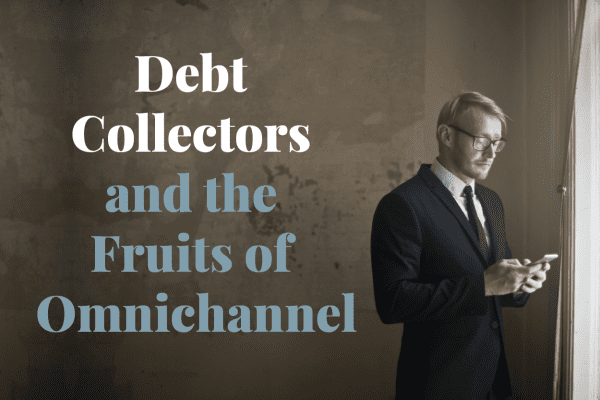No doubt, the debt collection industry is entering a new era. The 2020 FDCPA update represents a major paradigm shift for the US debt collection industry and for the 8 000+ nationwide firms.
The new law will go into effect in October 2021, and debt collectors will be able to harvest the knowledge base, tools, and mindset of the wider Customer Experience discipline. As we will see, one of the most important steps of this revolution will be to master the art of managing multiple digital channels.
But first, in case you missed it, the debt collection colleagues are in the midst of a new revolution:
The Context
The new and updated rules issued at the end of October by the Consumer Financial Protection Bureau (CFPB) sparked heated debates across the internet. From now on, debt collection agencies will have permission to contact debtors via new channels of communication, beyond voice calls.
Of course, the collection industry as a whole welcomed this ruling as a much-needed update on the Fair Debt Collection Practices Act (FDCPA), issued back in 1977. Both the legislator and the collectors felt that the old legal corpus needed to be in sync with the telecommunication revolution of the last couple of decades. And rightfully so.
On the other hand, consumer advocacy organizations are voicing concerns regarding the possibility of abuse. Some say that the new regulations can lead to unethical practices in an already tensioned filled business model.
The Legal Balance
According to the new act, debt collectors can now use email, SMS, social media channels, and other methods of electronic communication. At a first glance, the law favors the collectors, for the obvious reason that they can now use more channels to leverage more pressure. And while this is certainly true, the CPFB points out that:
Technologies such as email and text messaging allow consumers to exert greater control over the timing, frequency, and duration of communications with debt collectors, including by choosing when, where, and how much time to spend responding to a debt collector’s email or text message.
In addition, the new act also regulates telephone communication. In an article published on 30th of October, Kathleen L. Kraninger, director of CFPB, states that
…debt collectors will be presumed to violate federal law if the debt collector places telephone calls to a particular person in connection with the collection of a particular debt more than seven times within seven consecutive days or within seven consecutive days of having had a telephone conversation with that person about the debt.

Omnichannel, the (Un)forbidden Fruit
Given the new context, the omnichannel method will soon become priority #1 for each and every debt collection manager. The door is now open and the possibilities are endless.
As the name suggests, omnichannel is a platform that can act as a virtual hub, integrating multiple channels of communication at the same time. The term was first coined by the marketing industry.
Marketers would simultaneously deploy the same advertising campaign via multiple channels. They would keep a consistent message while adapting the creatives to suit the various channels. Thus, an omnichannel campaign would run TV and radio promos, paired with paid ads on social media and search engines. The immersive nature of this approach was so effective, that it quickly became an industry standard.
Being a highly successful concept, omnichannel was imported and adapted to other industries too. As such, with the advent of the social media revolution, it soon became a vital component of contact centers across the world.
Of course, the way it works for us (contact center professionals) is a little different, but the underlying concept remains. (If you want to learn more about the difference between omnichannel and multichannel, we have a special article on this very topic.)
One of the key features of omnichannel is that you are able to manage multiple channels from a single dashboard. And this can be applied both in outbound and inbound campaigns. The overall principle is that communication transcends the limitations imposed by the channels we use. A true omnichannel platform is able to create a so-called immersive experience (both for agents and clients alike).
Besides managing various channels, the omnichannel platform also keeps track of customer intelligence and status updates. Let’s have a quick look at what it means to deploy an omnichannel tactic as a debt collection agency.
Debt Collection and the Omnichannel Client Journey
For example, if a debtor initiates a self-service IVR procedure over the phone, the system will take note. Let’s say that at the end of this interaction, the client opts for receiving more personal debt information via email. Of course, an agent will then easily be able to send back the requested data via email.
But what if the client has one more question and wants to get in touch with the debt collector agent? For example, let’s assume that instead of calling the agent, the debtor sends a WhatsApp message. After a back and forth messaging, the two settle for a call the next day to clarify the last details concerning a payment plan. The agent gets in touch at the agreed hour and closes the deal, getting verbal consent from the client.
To recap, here is our hypothetical client journey:
- Initiate interaction with a self-service IVR procedure
- Receive debt information from a collector agent via email
- Contact the agent via WhatsApp
- Receive a call and settle for a payment plan
A true omnichannel solution will record each and every touchpoint of this journey and keep track of every change in the client’s status.
The Benefits of Bidirectional Communication
On the one hand, covering, recording, and tracking virtually every communication channel results in a better customer experience. By offering an uninterrupted interaction, the debt collection contact center creates a transparent and immersive environment. All this translates into better overall recovery rates.
On the other hand, an omnichannel platform records the complete history of debtor interactions. Of course, this centralization means fewer unintentional errors such as trying to collect the same debt twice. If an agent receives new intel about a former debtor, he will have at his fingertips the whole history: used and preferred channels of interaction, payment plan status, and contact information (that can now include email and social media IDs).
As a side note, this also contributes to countering the allegations of client advocacy organizations, as this type of error is one of their pain points.
To recap the benefits:
- Better overall customer experience
- Uninterrupted interaction
- A transparent and immersive environment
- A complete history of debtor interactions
- Less unintentional errors
- Better overall recovery rates
The NobelBiz Solution: OMNI+
The 2020 FDCPA is closing the gap between regular contact centers and debt collection contact centers, at least in terms of infrastructure. Up until now, collection agencies could not benefit and make use of the technological advancements that were shaping the wider contact center industry.
This is why NobelBiz is happy to introduce its leading omnichannel solution to the debt collection community.
NobelBiz OMNI+ is a complete omnichannel platform used by contact centers across the world to boost performance both in terms of revenue and work efficiency.
Its main function is to integrate various communication channels into one single working platform: from Voice and Email to SMS and Facebook Messenger, Twitter, WhatsUp, or Instagram to name but a few.
Of course, OMNI+ is much more than a simple communication hub. To get a more accurate picture of its true capabilities here is a quick overview:
- Limitless channel integrations
- Easy CRM incorporation
- Work-from-home compatible
- Intuitive agent dashboard
- Dynamic Business Router
- Full, extended training
- Quick 72-hour setup & more…
Our developing team is always ready to customize the product to suit any type of contact center. And we will be more than happy to help you set up your debt collection workflow, in light of the new regulations.

Andrei is an experienced marketing professional specializing in propelling growth for both B2B and B2C companies. Proficient in streamlining marketing operations and enhancing lead and customer experiences through SEO and marketing techniques.







